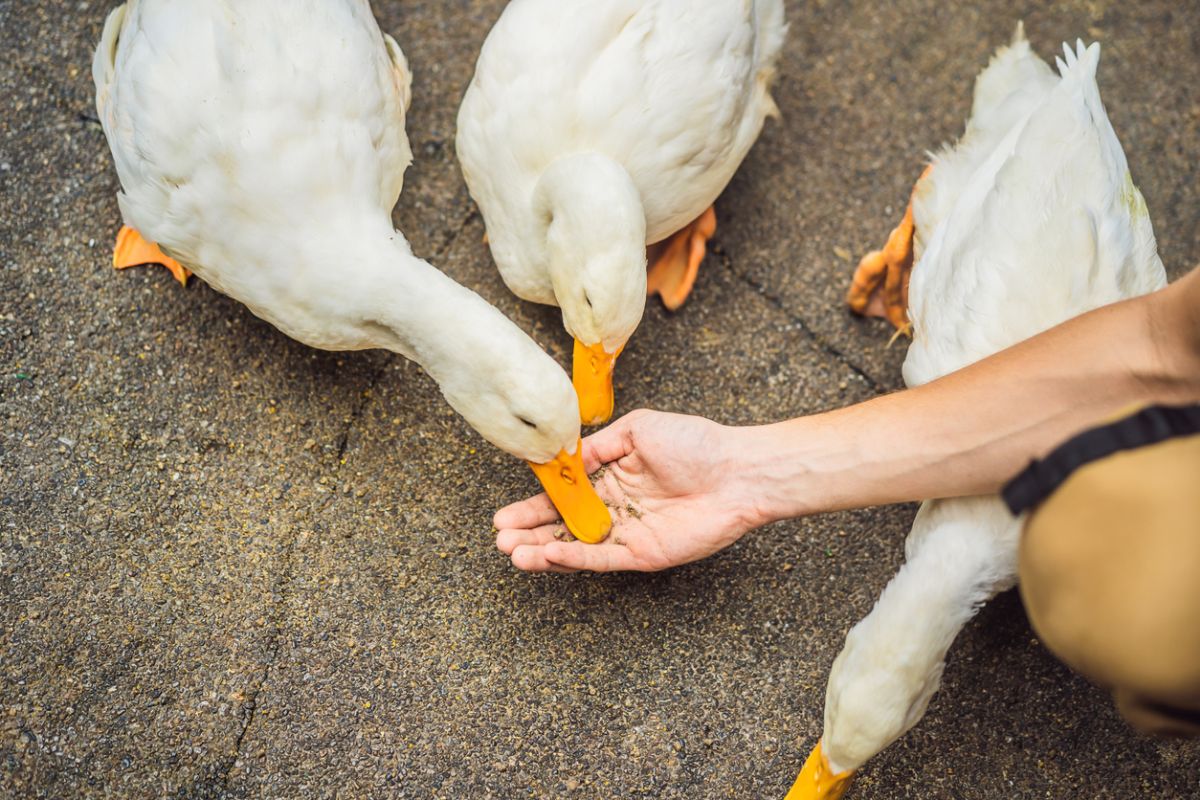Many people love to feed ducks, but they don’t always stop to wonder, “what do ducks eat?” Human foods aren’t always healthy or safe for birds, so many people don’t know what to feed ducks.
Whether you’re around domesticated ducks or wild ducks, you should be considerate of what you’re feeding them. If you don’t have any foods that are good for them, it’s best to leave them be. So, what do domestic ducks eat, and what can ducks eat in the wild?
What Do Pet Ducks Eat?
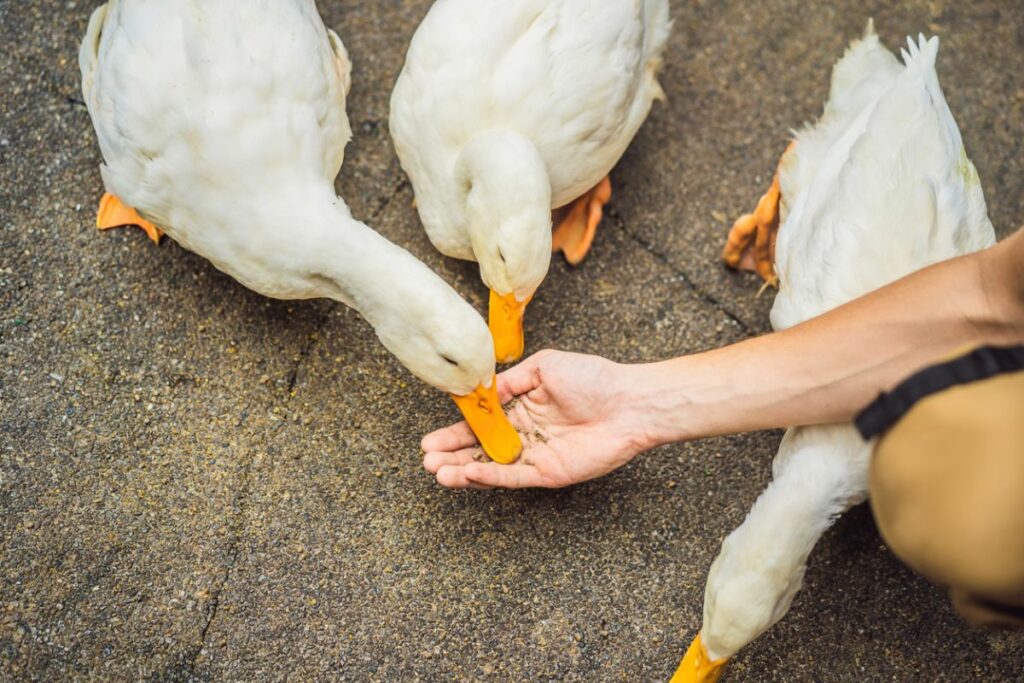
Pet ducks usually have a consistent diet, similar to a chicken’s. A duck or chicken feed is suitable for most duck breeds. What ducks eat depends on the age group of your birds. Most should eat domestic duck food that has between 16% and 20% protein.
Feeding pet ducks is about more than providing food for them. Even with a proper duck feed, it’s still a good idea to let your ducks forage. The more space you give them, the more opportunities they’ll have to find nutrients. Many keepers give their birds free-range time because it’s a way of feeding ducks naturally.
When ducks forage, they’ll pick up plants, bugs, slugs, and other critters, all of which are beneficial to their diets. As they develop a balanced duck diet, they’ll also be removing pests from your property.
“What do domesticated ducks like to eat?” depends on the individual duck’s preferences. Some popular healthy snacks you can give your ducks include fruits, vegetables, and grains. However, human foods with little nutritional value, such as bread and pasta, should be avoided.
Can Ducks Eat Chicken Feed?
Many keepers wonder, “can ducks eat chicken food?”, and the answer is yes. It may not have as many nutrients for ducks as duck feed would, but it’s safe for them. If you have chickens and ducks, you can choose an all flock feed.
All flock feeds are great for chickens, ducks, turkeys, and geese. Yet, it might not have enough vitamin B for ducks. So, you should only choose an all flock feed if you have more than just ducks in the enclosure. You can also make the feed richer in vitamins by adding some brewer’s yeast.
What Do Ducklings Eat?
If you’re feeding baby ducklings, you’ll need to use a feed that’s suitable for their growing bodies. Give them a chick feed with 20% to 22% protein, and then you can switch it to a waterfowl starter (which has 15% to 16% protein). When they turn 18 weeks old, they can start eating the adult feed.
Like adult ducks, a pet duckling can benefit from getting a wide range of nutrients from things like bugs, plants, and algae. That’s what they will primarily survive off of in the wild. Most baby ducks aren’t picky, so what ducklings eat is usually whatever is provided to them.
Do Ducks Drink Water?
Yes, ducks drink water. They need access to more water than chickens do. They usually use water to soften their food because it makes it easier for their bodies to absorb nutrients. However, you’ll need to refill the water often since it’ll fill up with food remnants quickly.
Keep a bowl of water near their feed rather than mixing the two together. Putting water in the feed would make it messy, soggy, or moldy, so it’s best to let the ducks do it themselves.
What Do Ducks Eat in the Wild?
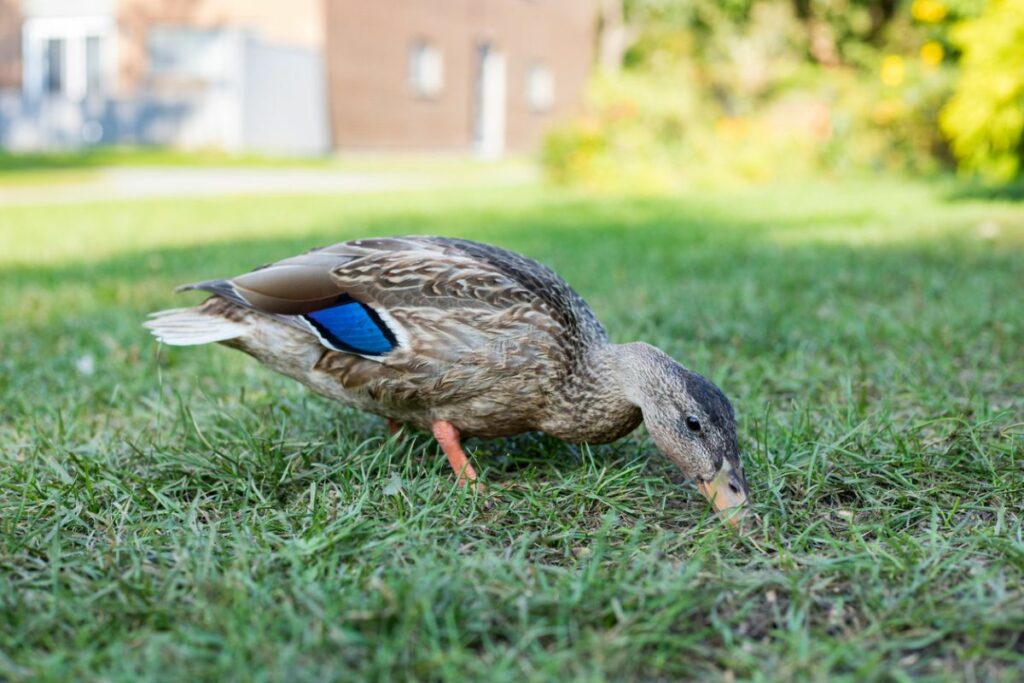
Wild ducks have a similar diet to domesticated ducks that forage for food. They will eat plants, small animals, and human foods, depending on what’s available. So, if you’ve ever wondered, “what can ducks eat?”, the answer is a wide variety of things.
Here are some foods that wild ducks will eat:
- Grass, leaves, roots, seeds, and other plant parts
- Grains like cracked corn, whole corn, oats, barley, and rice
- Vegetables like kale, lettuce, carrots, and broccoli
- Fruits like berries, bananas, watermelon, cucumbers, apples, and pears
- Worms and other bugs
- Snails and slugs
- Small fish and fish eggs
- Tadpoles and salamanders
So, wild ducks are not picky with their meals. Many of the plants and animals they eat are things they’ll find in the wild, but fruits, vegetables, and grains are items that they’ll likely collect from humans.
Mallards are the most common duck species in North America. If you’re wondering “what do mallards eat?”, their diets are the same as most duck species.
Are Ducks Omnivores?
Yes, ducks are considered omnivores, so they’ll eat both plants and animals as they search for food. They usually only hunt smaller critters, such as bugs, slugs, and small fish.
How Do Ducks Eat Their Food?
How ducks eat is different than chickens. To find nutrients in the wild, ducks use their beaks to sift through mud and muck near water. Water can run out of the duck’s beak while larger items, like plants and animals, will remain trapped inside.
Do Ducks Have Teeth?
Ducks don’t have teeth, but instead, the have bristles on the edge of their beaks. Those bristles allow them to hold tasty treats in their mouths before enjoying them.
Types of Wild Ducks
Most duck breeds fit into two categories: divers or dabblers. Divers are the ducks you see floating on the water that regularly dive beneath the surface. They dip below the water to search for anything edible, such as plants, crustaceans, and certain fish. Some ducks can stay below the surface for several minutes at a time.
Then, dabblers are the ducks that stay along the shore of the water. They’re more likely to pick up objects on land or in the shallow end, such as plants, berries, and mud-dwelling animals.
What Do Baby Ducks Eat in the Wild?
Wild baby ducks learn quickly from adults. They’ll eat just about anything they can find, including worms, insects, algae, and plants. Treats for baby ducks should consist of small, soft items so they can digest them easier.
Should You Feed Wild Ducks?
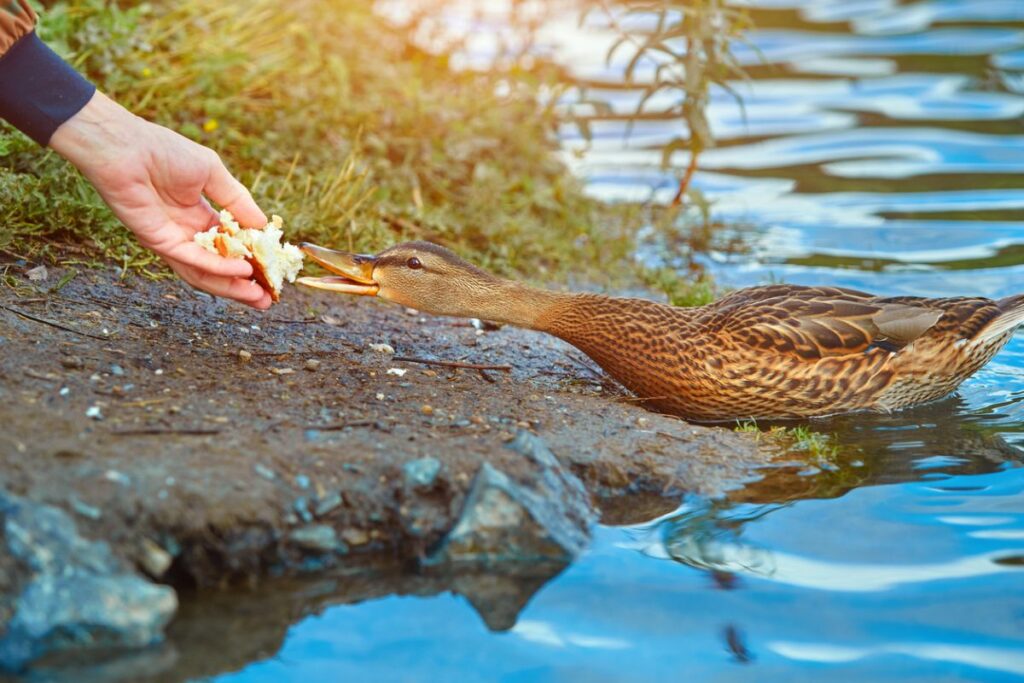
In most cases, there’s nothing wrong with feeding wild ducks. However, you need to make sure you only feed them things that are safe and beneficial for them.
Should You Feed Ducks Bread?
A common misconception is that bread is a great snack for ducks, but too much bread can make ducks sick. It can lead to digestive problems, causing them to defecate more, which can be dangerous for ducks and the environment. Also, moldy bread could be fatal to birds.
Small amounts of bread won’t hurt them, but it’s impossible to know how much bread a wild duck has consumed. So, ducks can’t eat bread. Instead, give them healthy treats like fruits, vegetables, and digestible grains. If you’re unsure if the food you have is safe for ducks, it’s best to not give it to them just to be safe.
Do Ducks Bite?
Yes, ducks will bite if they feel threatened, which is another reason to be cautious when feeding them. Even though ducks don’t have teeth, their bites can still hurt in some cases.
What Do Ducks Eat in the Winter?
In winter, ducks continue to eat most of the same foods as before. However, foraging can be more difficult with frozen water and snow on the ground. They mostly feed on seeds and aquatic vegetation when it’s colder outside.
Dangerous Foods for Ducks
A lot of the foods that humans love aren’t safe for ducks. Foods like bread have very little nutritional value for birds, so it’s best to avoid them to minimize the risks.
Here are some foods that ducks should NOT eat:
- Onions
- Avocado
- Bread
- Chips
- Crackers
- Donuts
- Cereal
- Nuts
- Citrus
- Potatoes
- Popcorm
- Mangoes
- Raw beans
- Moldy foods
Anything that we might consider “junk food” is likely bad for ducks too. So, unless you’re certain that the food your eating is good for ducks, don’t give it to them.
All the foods mentioned above lack the necessary vitamins, minerals, and nutrients that ducks need. Since many of them can cause health complications, it’s not worth the risk. Not only will they make ducks sick, but the uneaten parts could pollute bodies of water.
How Often Do Ducks Need to Eat?
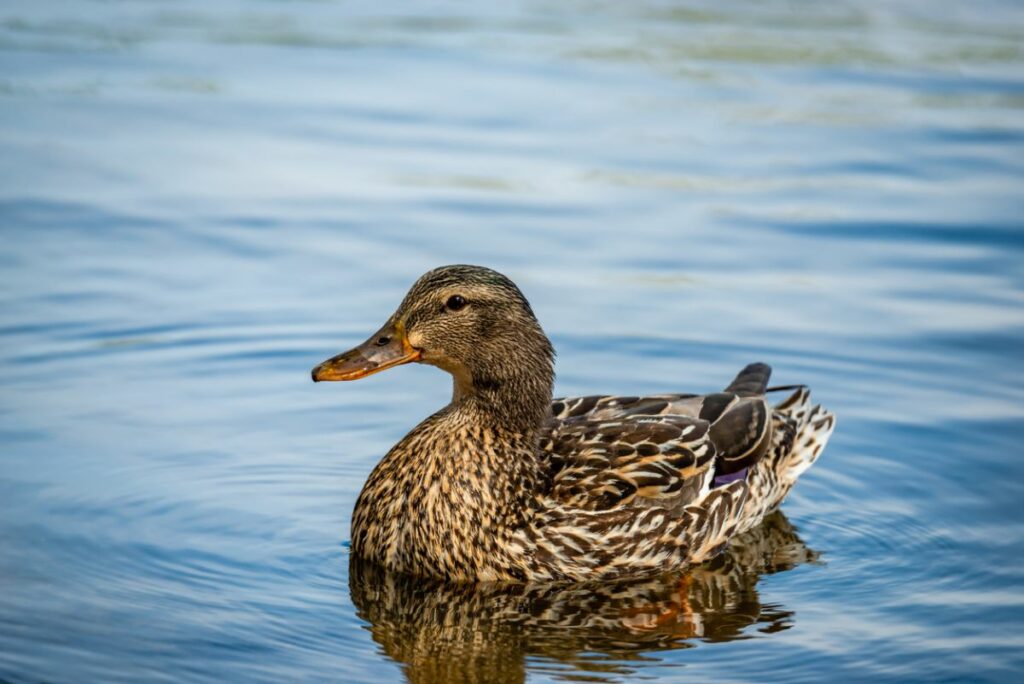
Ducks don’t have a strict feeding schedule. So, they’ll usually eat throughout all daylight hours. If food is provided for them, they’ll snack on it throughout the day. Then, they’ll spend the rest of their time foraging.
During hunting season, ducks may eat more at night. Most keepers confine ducks at night, but if the birds are kept out during that time, you may see them hunting for critters. Divers may hunt for small fish and crustaceans regardless of the time of day.
If you only provide food for your ducks at certain times, they’ll likely adjust to that schedule and expect to get fed at those specific times. However, feeding them on a schedule won’t stop them from foraging. Foraging is a healthy duck behavior that allows them to pick up extra nutrients.
Is a Duck’s Digestive System Like a Chicken’s?
Duck digestion is somewhat similar to a chicken’s, but there are some key differences. Chickens have a crop, which helps break down food before it gets fully digested. However, ducks don’t have that organ, so they’re not at risk of concerns like a sour crop.
Instead, ducks have a flexible esophagus, which can expand to hold food. Some ducks can hold up to a 1/4-pound of grain in their esophagus. Then, the food goes into the gizzard, which is similar to a chicken gizzard. Yet, a duck gizzard can grow or shrink depending on what your duck’s diet looks like.
Solid items like acorns or crustaceans may cause the gizzard to grow and the esophagus to increase its grinding power. Softer items like berries, plants, and slugs don’t need as much power, so the gizzard may contract as a result.
The different sizes of the gizzard don’t harm ducks, but it will only significantly grow or shrink if the duck only eats objects of the same size. Most ducks eat a variety of items, so their organs won’t need to adjust to digest it.
Frequently Asked Questions
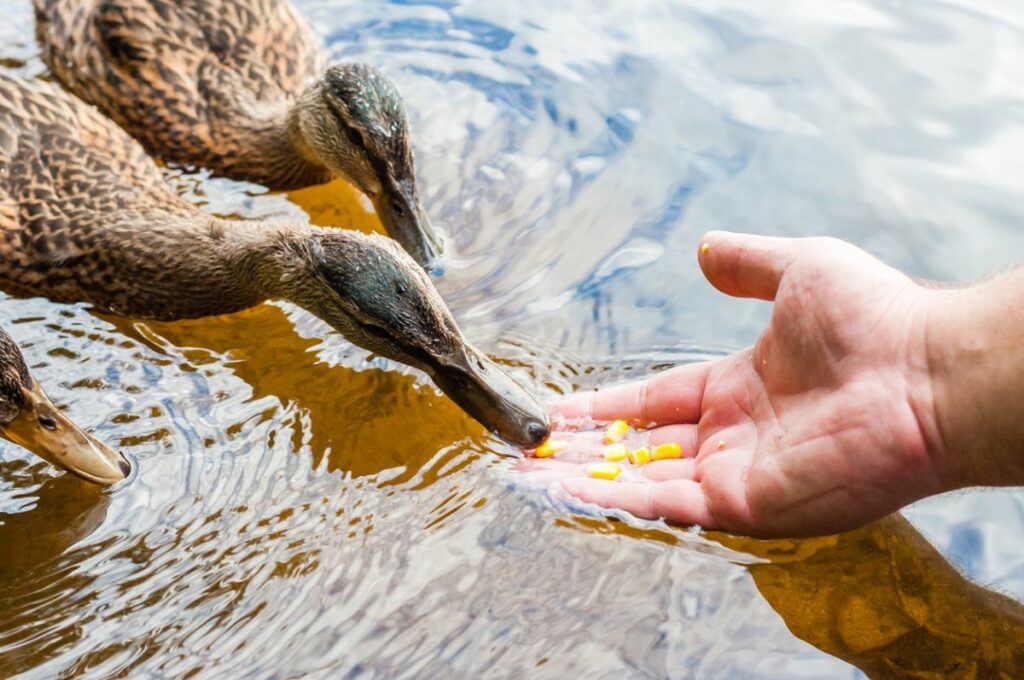
Choosing what to feed your feathered friends can be tricky, so you might still have some lingering questions. Here are a few things that new duck owners commonly wonder.
Yes, ducks eat fish, as long as they’re small enough for them to swallow. Small fish, fish eggs, tadpoles, and crustaceans are just some aquatic creatures that your duck may pick up while swimming.
Yes, ducks who forage will graze on grass. They may also eat other plants, such as dandelions and lettuce. Foraging for a variety of foods is the perfect way for ducks to get all the nutrients they need.
Yes, ducks can eat apples, but the fruit should be cut up into small pieces. Large chunks or apple seeds could be difficult for birds to digest. If chopped up and served in moderation, apples can be a great source of vitamins, calcium, and fiber.
Yes, watermelon is a great food for ducks. It’s soft and provides water, making it an ideal snack for a hot summer day. The fruit is also packed with vitamins that ducks need.
If you’re wondering, “what do ducks like to eat?” then it’s difficult to give one solid answer. Every duck has different preferences, so it’s up to you to discover what they get the most excited to eat. Some favorite duck snacks include corn, peas, cucumbers, and lettuce.
Preparing for a Duck
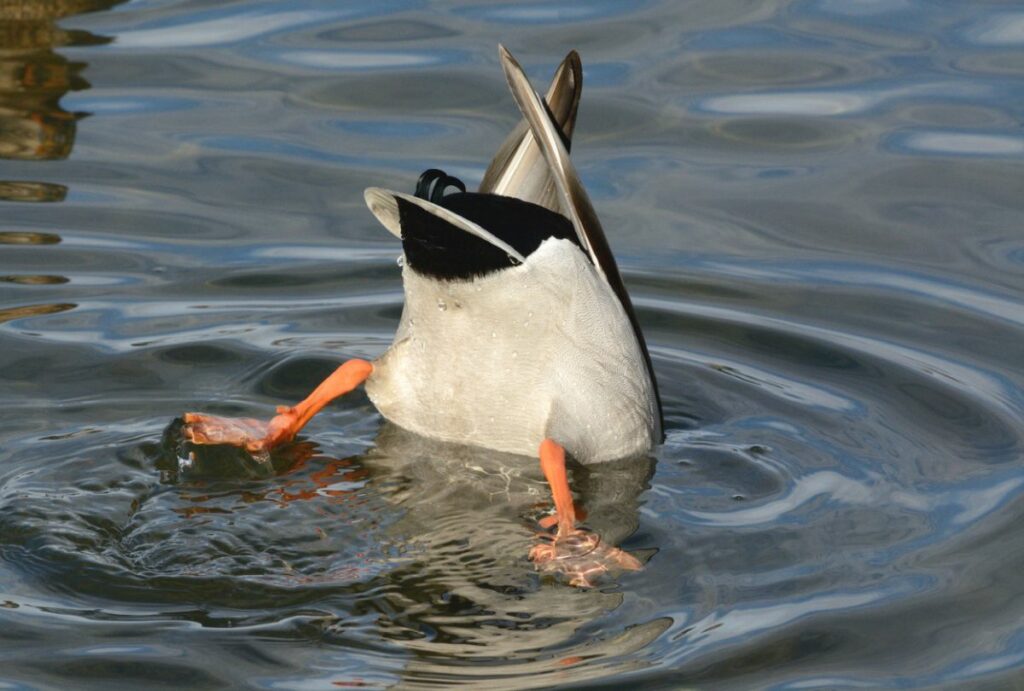
If you’ve ever wondered what to feed pet ducks or how to feed wild ducks, there’s a lot to understand. Even though ducks will happily eat whatever you serve them, not every food is healthy and safe.
Before you give food to a duck, make sure it’s something that will benefit them. If you’re unsure if the food is safe, don’t give it to the ducks. As much as ducks love extra snacks, they’ll get plenty of food from foraging. So, whether you’re feeding a domesticated or wild duck, be careful with what you give them.
